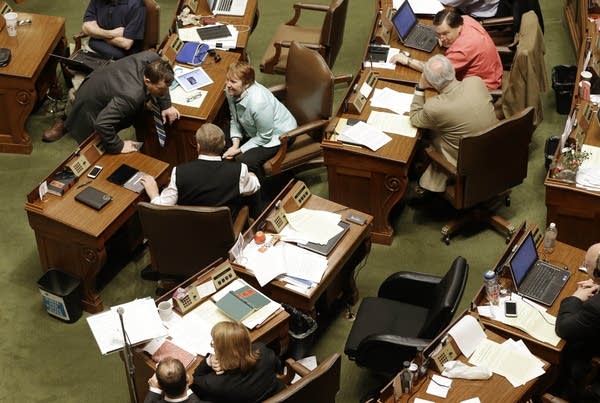Budget in hand, Legislature adjourns
Go Deeper.
Create an account or log in to save stories.
Like this?
Thanks for liking this story! We have added it to a list of your favorite stories.

Minnesota lawmakers worked right up to their midnight deadline to put the final pieces of a two-year, $38 billion state budget into place. They then adjourned for the year.
The last votes included the Senate's passage of a massive tax bill, and House approval of a measure to finance state government operations. Both votes were delayed most of the final day by negotiations on a new, smaller bonding bill that covers repairs on the State Capitol.
The last day of the session began with the House resuming debate on a contentious bill to allow for the unionization of two groups of government-subsidized workers: in-home child care providers and personal care assistants. Several Republicans, including Rep. Linda Runbeck, of Circle Pines, described the effort as a money grab by organized labor.
"This is just shocking," she said. "You've got big unions and big government double teaming small business owners. The bottom line is folks, what's happening is we're taking taxpayer dollars that are intended to help small children and the vulnerable elderly and disabled, and we're giving them over to the union."
Turn Up Your Support
MPR News helps you turn down the noise and build shared understanding. Turn up your support for this public resource and keep trusted journalism accessible to all.
But Democrats argued that the two groups of workers deserve a right to organize for collective bargaining. DFL Rep. Michael Nelson, of Brooklyn Park, said his bill doesn't, as critics claimed, intrude on small businesses.
"It also does not form or create a union, or force anyone into one. It just gives those that have expressed an interest a chance to have a vote on whether or not they want to form a union," he said.
The passage of the bill ended a 10-hour debate that stretched over more than two days. But it also triggered a harsh reaction from opponents on the floor to applause coming from supporters in the gallery.
"There being 68 ayes and 66 nays the bill is passed, its title agreed to. Mr. Speaker. Mr. Speaker. Yeah, Mr. Speaker. Go ahead and applaud, that's right. Mr. Speaker, clear the decks. Mr. Speaker. Stop. Stop. We're not in charge. Let 'em applaud they own the place."
Three days after an $800 million bonding bill failed to gain the necessary 81 House votes needed for passage, a pared down $156 million package of public construction projects passed. The measure includes money for flood mitigation projects and improvements to the Minneapolis Veterans Home. But most of the bill, $109 million, is for the next phase of renovation work on the deteriorating State Capitol building. DFL Rep. John Ward, of Brainerd, said keeping the renovation going is critical.
"This Capitol is a 108-year-old building that is an iconic gem for the state of Minnesota. But it is at its tipping point, members. It is at its tipping point," he said.
The backroom House negotiations to reach a deal on the bonding bill held up Senate action on the tax bill. That critical debate finally began with two hours remaining in the session.
The DFL-backed tax bill raises more than $2 billion in new revenue, through an income tax increase on the wealthiest 2 percent of Minnesotans, a cigarette tax increase of $1.60 per pack and the elimination of some corporate subsidies. It pays for new spending for public education and property tax relief, as well as erasing the state's $627 million projected budget deficit.
Republican Sen. Julianne Ortman, of Chanhassen, said the tax bill is the result of excessive government spending under Democrats.
"Our Minnesota state Legislature, led by the DFL, has said yes to virtually every request of every special interest group that has come and asked for something more. Nearly every spending proposal is included in the state budget. On a day like this we realize how much the cost is going to be, and it's going to be enormous," she said.
Republicans also argued that the tax increases will kill jobs and drive businesses out of the state. But DFL Senate Majority Leader Tom Bakk, of Cook, said the CEOs he's met with place greater importance on the state workforce.
"This state is going to be successful if we have the best workforce around. Lower taxes would be nice, but you have to continue to invest in what has made you strong. And I would argue that, and I think the CEOs I met with would argue, it's been the investment Minnesota has made in its workforce that has created all these Fortune 500 companies here and all the vendors that serve them," he said.
DFL leaders were unable to reach a final agreement for a minimum wage increase. Bakk said he expects a bill to be passed next session.
Lawmakers return for the 2014 session in late February.




